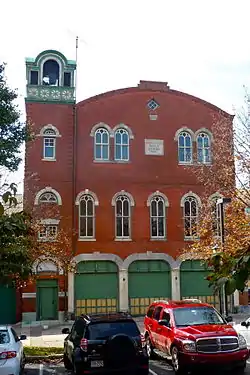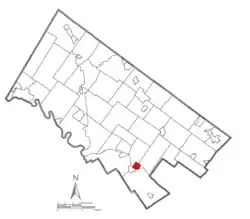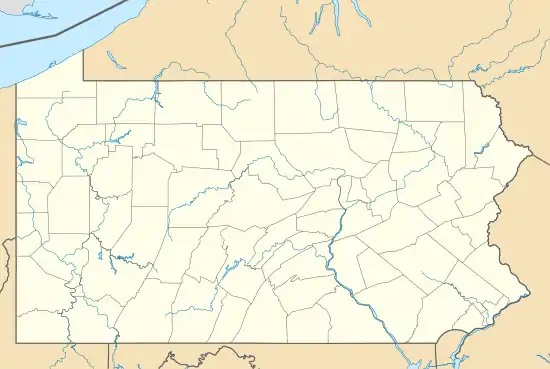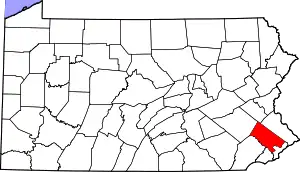Conshohocken, Pennsylvania
Conshohocken (/ˌkɒnʃəˈhɒkən/ kon-shə-HOK-ən; Lenape: Kanshihàkink)[3] is a borough on the Schuylkill River in Montgomery County, Pennsylvania, in suburban Philadelphia. Historically a large mill town and industrial and manufacturing center, after the decline of industry in recent years Conshohocken has developed into a center of riverfront commercial and residential development.[4] In the regional slang, it is sometimes referred to by the colloquial nickname Conshy (/ˈkɒnʃi/ KON-shee).[5] The name "Conshohocken" comes from the Unami language, from either Kanshi'hak'ing, meaning "Elegant-ground- place",[6] or, more likely, Chottschinschu'hak'ing, which means "Big-trough-ground-place" or "Large-bowl-ground-place", referring to the big bend in the Tulpe'hanna (Turtle River, or modern Schuylkill River).[7]
Borough of Conshohocken | |
|---|---|
 Washington Hose Company, a historic fire station | |
| Nickname(s): Conshy | |
 Location of Conshohocken in Montgomery County, Pennsylvania. | |
 Conshohocken Location of Conshohocken in Pennsylvania  Conshohocken Conshohocken (the United States) | |
| Coordinates: 40°04′38″N 75°18′7″W | |
| Country | United States |
| State | Pennsylvania |
| County | Montgomery |
| Founded | 1830 |
| Incorporated | 1850 |
| Government | |
| • Type | Council-manager |
| • Mayor | Yaniv Aronson |
| Area | |
| • Total | 1.04 sq mi (2.69 km2) |
| • Land | 1.00 sq mi (2.60 km2) |
| • Water | 0.04 sq mi (0.09 km2) |
| Elevation | 197 ft (60 m) |
| Population (2010) | |
| • Total | 7,883 |
| • Estimate (2019)[2] | 8,047 |
| • Density | 8,014.94/sq mi (3,093.86/km2) |
| Time zone | UTC-5 (EST) |
| • Summer (DST) | UTC-4 (EDT) |
| ZIP code | 19428 |
| Area code(s) | 610 and 484 |
| FIPS code | 42-15848 |
| Website | www |
The sister community of West Conshohocken is located on the opposite side of the Schuylkill River.
Geography
Conshohocken is located at 40°4′38″N 75°18′7″W (40.077135, -75.302009).[8]
According to the United States Census Bureau, the borough has a total area of 1.0 square mile (2.6 km2), of which, 1.0 square mile (2.6 km2) of it is land and 0.04 square miles (0.10 km2) of it (2.97%) is water.
Conshohocken fronts the Schuylkill River. A rather sharp bend in the river at Conshohocken gives the Schuylkill Expressway, which hugs the far bank, a curve that is well known to regional radio listeners as the Conshohocken curve (it is a staple of traffic reports). Railroad tracks line both river banks, reflecting the valley's heavy industrial past as well as its continuing rail activity including Norfolk Southern and SEPTA. A rail trail portion of the Schuylkill River Trail also passes through.
Politics and history
The place was first settled about 1820, and was for several years known as Matson's Ford; in 1830 it was laid out as a town and received its present name, a Native American word meaning “pleasant valley.”[9]
The Pennsylvania guide, compiled by the Writers' Program of the Works Progress Administration, briefly described Conshohocken in 1940:
Founded early in the nineteenth century after construction of the Schuylkill Canal, it was incorporated as a borough in 1850. Settlement in this vicinity began as early as 1690. A flourishing industrial community with frame and brick houses along wide and often hilly streets, Conshohocken has a tire plant, a steel and iron mill, a boiler factory, and textile mills. [10]
— Federal Writers'Project, "Part III: Tours", Pennsylvania: A Guide to the Keystone State (1940)
Conshohocken has a city manager form of government with a mayor and a seven-member borough council. The mayor is Yaniv Aronson.
The borough is part of the Fourth Congressional District (represented by Rep. Madeleine Dean), the 148th State House District (represented by Rep. Mary Jo Daley) and the 7th State Senate District (represented by Sen. Vincent Hughes).
Demographics
| Historical population | |||
|---|---|---|---|
| Census | Pop. | %± | |
| 1850 | 727 | — | |
| 1860 | 1,741 | 139.5% | |
| 1870 | 3,071 | 76.4% | |
| 1880 | 4,561 | 48.5% | |
| 1890 | 5,470 | 19.9% | |
| 1900 | 5,762 | 5.3% | |
| 1910 | 7,480 | 29.8% | |
| 1920 | 8,481 | 13.4% | |
| 1930 | 10,815 | 27.5% | |
| 1940 | 10,776 | −0.4% | |
| 1950 | 10,922 | 1.4% | |
| 1960 | 10,259 | −6.1% | |
| 1970 | 10,195 | −0.6% | |
| 1980 | 8,599 | −15.7% | |
| 1990 | 8,064 | −6.2% | |
| 2000 | 7,589 | −5.9% | |
| 2010 | 7,883 | 3.9% | |
| 2019 (est.) | 8,047 | [2] | 2.1% |
| Sources:[11][12][13][14] | |||
As of the 2010 census, the borough was 88.7% White, 6.5% Black or African American, 0.1% Native American, 1.8% Asian, and 1.7% were two or more races. 3.5% of the population were of Hispanic or Latino ancestry .
As of the census[13] of 2000, there were 7,589 people, 3,329 households, and 1,834 families residing in the borough. The population density was 7,720.4 people per square mile (2,989.9/km2). There were 3,518 housing units at an average density of 3,578.9 per square mile (1,386.0/km2). The racial makeup of the borough was 89.88% White, 7.77% African American, 0.08% Native American, 0.84% Asian, 0.01% Pacific Islander, 0.49% from other races, and 0.92% from two or more races. Hispanic or Latino of any race were 1.34% of the population.
There were 3,329 households, out of which 22.9% had children under the age of 18 living with them, 36.5% were married couples living together, 14.1% had a female householder with no husband present, and 44.9% were non-families. 36.0% of all households were made up of individuals, and 12.6% had someone living alone who was 65 years of age or older. The average household size was 2.27 and the average family size was 3.02.
In the borough the population was spread out, with 20.8% under the age of 18, 8.8% from 18 to 24, 35.9% from 25 to 44, 19.4% from 45 to 64, and 15.1% who were 65 years of age or older. The median age was 35 years. For every 100 females, there were 94.2 males. For every 100 females age 18 and over, there were 91.1 males.
The median income for a household in the borough was $43,599, and the median income for a family was $50,601. Males had a median income of $36,299 versus $30,541 for females. The per capita income for the borough was $22,128. About 4.2% of families and 5.8% of the population were below the poverty line, including 6.9% of those under age 18 and 12.7% of those age 65 or over.
According to the 2013 American Community Survey 5-Year Estimate,[15] the median household income in the borough had risen to $73,750. The median income for a family was $88,049, and the per capita income was $41,144. 5.3% of families and 7.7% of the population were below the poverty line, including 11.3% of children under age 18 and 6.3% of those age 65 and over.
| Year | Republican | Democratic |
|---|---|---|
| 2020 | 31.6% 1,753 | 67.0% 3,718 |
| 2016 | 31.9% 1,568 | 62.2% 3,057 |
| 2012 | 39.4% 1,781 | 58.9% 2,666 |
| 2008 | 34.3% 1,473 | 65.0% 2,796 |
| 2004 | 35.9% 1,350 | 63.7% 2,397 |
| 2000 | 32.4% 946 | 65.1% 1,900 |
Climate
Conshohocken is in the outer rim of a humid subtropical climate (Cfa).
| Jan | Feb | Mar | Apr | May | Jun | Jul | Aug | Sep | Oct | Nov | Dec | |
|---|---|---|---|---|---|---|---|---|---|---|---|---|
| Record High | 76° | 75° | 83° | 98° | 98° | 100° | 108° | 106° | 102° | 90° | 85° | 76° |
| Average High | 41° | 44° | 53° | 64° | 75° | 83° | 88° | 87° | 80° | 68° | 57° | 45° |
| Average Low | 22° | 24° | 31° | 41° | 51° | 61° | 66° | 64° | 56° | 44° | 35° | 27° |
| Record Low | -12° | -5° | 8° | 15° | 29° | 28° | 48° | 40° | 35° | 26° | 14° | -10° |
January is on average the coldest month, and July is on average the hottest. The hardiness zone is 7a.
Transportation
Conshohocken is served by two SEPTA regional railroad stations, both of which are along the Manayunk/Norristown Line. The main one is officially located at Washington and Harry Streets, and the other is at Spring Mill at the end of East North Lane, south of Hector Street.
The area is also served by two interstate highways: I-76 (here the Schuylkill Expressway) and I-476 (locally referred to as "the Blue Route").
Education
Residents of Conshohocken are served by the Colonial School District.
Private schools in the area include AIM Academy and The Miquon School.
Conshohocken Catholic School, of the Roman Catholic Archdiocese of Philadelphia, closed in 2012.[17]
Economy
- Allied Universal headquarters East Coast
- AmerisourceBergen headquarters (2020)
- IKEA US headquarters
- Kynetic (the umbrella company founded by Michael G. Rubin to cover Fanatics, Shop Runner, and Rue La La)
- The NBOME National Center for Clinical Skills Testing
- National Lacrosse League headquarters
- Saladworks headquarters
Notable people
- Da'Rel Scott (NFL Player)
See also
References
- "2019 U.S. Gazetteer Files". United States Census Bureau. Retrieved July 28, 2020.
- "Population and Housing Unit Estimates". United States Census Bureau. May 24, 2020. Retrieved May 27, 2020.
- "Lenape Talking Dictionary". Archived from the original on 2012-03-15. Retrieved 2012-05-27.
- Fact Sheets-CONSHOHOCKEN BOROUGH Archived 2007-04-18 at the Wayback Machine
- ALL ABOUT Conshy, Conshohocken Pa
- http://www.talk-lenape.org/search.php?q=Kanshihakink+&x=35&y=5&ls=lenape Archived 2013-12-10 at the Wayback Machine.
- Brinton, Daniel G., C.F. Denke, and Albert Anthony. A Lenâpé - English Dictionary. Biblio Bazaar, 2009. ISBN 978-1103149223, pp. 28 and 47.
- "US Gazetteer files: 2010, 2000, and 1990". United States Census Bureau. 2011-02-12. Retrieved 2011-04-23.
-
 One or more of the preceding sentences incorporates text from a publication now in the public domain: Chisholm, Hugh, ed. (1911). "Conshohocken". Encyclopædia Britannica. 6 (11th ed.). Cambridge University Press. pp. 977–978.
One or more of the preceding sentences incorporates text from a publication now in the public domain: Chisholm, Hugh, ed. (1911). "Conshohocken". Encyclopædia Britannica. 6 (11th ed.). Cambridge University Press. pp. 977–978. - Federal Writers' Project (1940). Pennsylvania: A Guide to the Keystone State (1st ed.). New York: Oxford University Press. p. 426.
- "Number of Inhabitants: Pennsylvania" (PDF). 18th Census of the United States. U.S. Census Bureau. Retrieved 22 November 2013.
- "Pennsylvania: Population and Housing Unit Counts" (PDF). U.S. Census Bureau. Retrieved 22 November 2013.
- "U.S. Census website". United States Census Bureau. Retrieved 2008-01-31.
- "Annual Estimates of the Resident Population". U.S. Census Bureau. Archived from the original on 2013-11-20. Retrieved 22 November 2013.
- "American FactFinder". United States Census Bureau. Retrieved 2015-11-27. "U.S. Census website". United States Census Bureau. Retrieved 2015-10-25.
- "Montgomery County Election Results". Montgomery County, Pennsylvania. Retrieved January 16, 2017.
- "2012 Catholic grade school consolidations/closings". Catholicphilly.com. 2012-07-15. Retrieved 2020-04-22.
External links
| Wikimedia Commons has media related to Conshohocken, Pennsylvania. |
| Wikivoyage has a travel guide for Conshohocken. |
